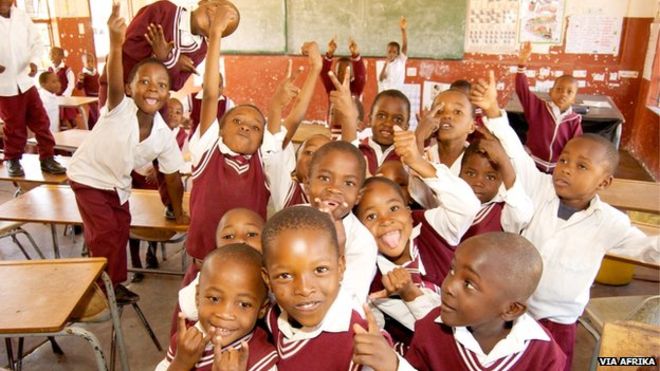África/Sudáfrica/26 de Agosto de 2016/Autor: Nyiko Shikwambane/Fuente: All Africa
RESUMEN: El 17 de agosto, la justicia social ONG Sección 27 publicó un informe titulado «Demasiados niños que quedan atrás: La inclusión en el sistema de educación inclusivo de Sudáfrica». El informe es el resultado del trabajo de investigación llevado a cabo por Tim Fish Hodgson y Silomo Khumalo en el norte de KwaZulu Natal, en colaboración con la Fundación Philisa Isizwe para las personas que viven con discapacidades. La investigación siguió la vida de 55 cuidadores de niños con discapacidad que se encuentren en centros de educación especial o que no pueden acceder a ningún tipo de escolarización. Sección 27 se reunió con los padres y cuidadores para identificar los problemas en el Distrito Umkhanyakude en KwaZulu Natal.«Nos encontramos cerca de 50 padres que consideramos como nuestros clientes. Cuando nos encontramos con esos padres, nos dimos cuenta de que había varios problemas con el acceso de los niños con discapacidades. Los padres se quejaron de que las tasas eran demasiado caros, las escuelas estaban lejos de casa y que los niños fueron abusados en sus albergues «, dijo Silomo Khumalo, uno de los autores del informe.
On 17 August, social justice NGO Section 27 released a report entitled «Too Many Children Left Behind: Inclusion in the South African Inclusive Education System». The report is a result of research work conducted by Tim Fish Hodgson and Silomo Khumalo in northern KwaZulu Natal in partnership with the Philisa Isizwe Foundation for persons living with disabilities.
The research followed the lives of 55 caregivers for children with disabilities who are either in special schools or are unable to access any kind of schooling. Section 27 met with parents and caregivers to identify the issues in the Umkhanyakude District in KwaZulu Natal.
«We met about 50 parents who we regard as our clients. When we met those parents, we found out that there were various issues with access for children with disabilities. Parents complained that the fees were too expensive, the schools were far from home and that the children were abused in their hostels,» said Silomo Khumalo, one of the authors of the report.
After looking at those who were not in any kind of schooling, they investigated further and considered the inclusive education legislative and policy framework in relation to the Constitution. Section 29 of the Constitution says every child has the right to basic education, which includes children with disabilities.
The Schools Act does not exclude children with disabilities: section 12(4) of the Act says that children with disabilities have the choice between attending a mainstream school or a special needs school. However, this choice is meaningless if mainstream schools lack the necessary resources to accommodate learners with disabilities. Mainstream schools often deny access to children with disabilities or monitor their behaviour like a daycare centre. Either way, no effective learning is done and these children should be considered among those who are «out of school».
The Sisizakele Special School is one of the only schools in the district that has the capacity to educate disabled children. Unfortunately, there is a long waiting list to get access to this school because it does not have the capacity to deal with the number of learners who need access. Those who cannot be accommodated at Sisizakele will have to spend their days at crèche without furthering their education.
«She now goes to a crèche near Manguzi Hospital. She is excited to be there, and was quite lonely at home by herself without other children. I want her to have a skill that she will be able to do well, so that if I pass away, my child will be able to have some way of making a living for herself,» said a parent of a child with physical and intellectual disabilities in Manguzi.
«In order for us to assist these parents we had to understand the issues faced by teachers and house care in special schools schools. We received complaints about most teachers not having the adequate amount of training to teach learners with disabilities. That is why we have cases of full service schools treating children with disabilities like clients of a day care centre,» said Khumalo.
Children are admitted into mainstream schools which lack the capacity to teach them. Similarly, the report suggests that special schools are understaffed and lacking capacitated employees. The abuse in hostels is prevalent in special schools because the house parents are merely volunteers in the space who earn a stipend of R1, 000 per month.
«We have begun looking at the education system before the current democratic state. We found that black learners with disabilities suffer from a kind of ‘double discrimination’. They are excluded out of the education system by virtue of their disabilities. They are excluded because schools in rural areas don’t have the adequate resources or skills to accommodate children living with disabilities,» says Khumalo.
The report recommends that the National Department of Education reimagine the implementation of the inclusive education system. It has been 15 years since the inclusive education policy was passed in 2001, but no apparent implementation to date. «Section 27 wants to sit with the department to discuss how we can better implement the policy in rural communities. There is a big gap between the South African education policy and the reality,» said Khumalo. The report includes recommendations for funding, school support schemes, skills and vacancies to create a more efficient inclusive education system.
Fuente: http://allafrica.com/stories/201608241101.html
Fuente de la imagen: http://www.bbc.com/news/business-28191371







 Users Today : 257
Users Today : 257 Total Users : 35459852
Total Users : 35459852 Views Today : 430
Views Today : 430 Total views : 3418402
Total views : 3418402